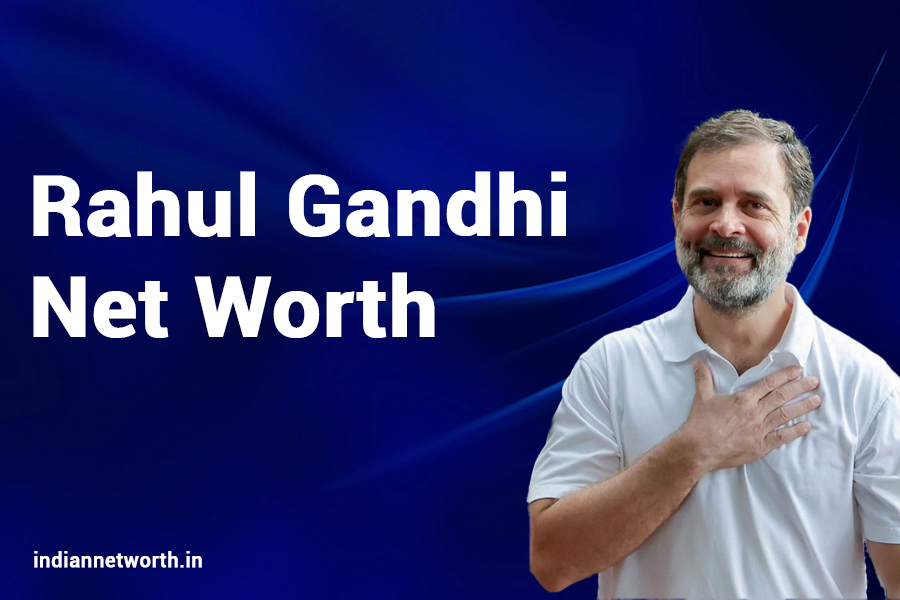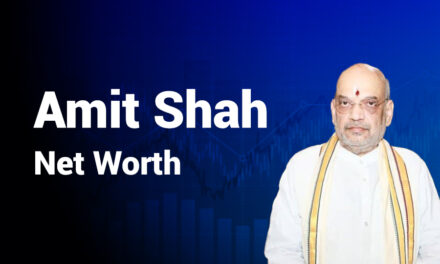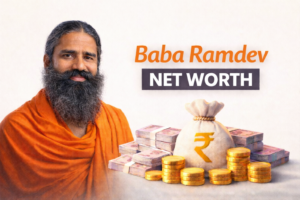Rahul Gandhi, a prominent figure in Indian politics, has been a subject of both admiration and criticism over the years. He is well-known for being a key member of the Indian National Congress and the son of Rajiv Gandhi and Sonia Gandhi, which places him squarely within India’s most influential political lineage. With a keen interest in socio-economic issues, his position has made him both a leader and a target in the ever-evolving political landscape. As we approach 2025, the curiosity surrounding Rahul Gandhi’s net worth continues to grow significantly. This article aims to explore his financial status, lifestyle choices, assets, and other relevant aspects that contribute to his public image and influence in contemporary politics.
What is Rahul Gandhi’s Net Worth?
As of 2025, Rahul Gandhi’s net worth is estimated to be around INR 1,000 crore, which translates to approximately $120 million. His wealth is derived from a diverse array of sources, including lucrative real estate holdings, strategic investments, and his extensive political career. While this impressive figure provides a glimpse into his financial standing, it is crucial to delve deeper into the context behind these numbers, as it reveals the complexities of wealth accumulation in the political arena.
Brief Overview of Rahul Gandhi’s Financial Sources
- Political Career: As a member of the Lok Sabha, Rahul receives a salary and benefits that contribute to his income.
- Family Wealth: His family has a considerable historical wealth accumulated over decades in politics and business.
- Investments: Investments in various ventures have supplemented his income.
In understanding his net worth, it’s also crucial to explore his expenditures, assets, and lifestyle.
Early Life and Education
Rahul Gandhi was born on June 19, 1970, in New Delhi, India. Due to significant security issues faced by his family, he spent much of his early life abroad, where he could be safer from potential threats. After completing his schooling in the UK, he pursued higher studies in the United States. He ultimately earned an M.Phil. from the prestigious University of Cambridge. This diverse and comprehensive education equipped him with the critical knowledge and skills needed to navigate the intricate and often challenging world of politics effectively.
Family Background and Political Legacy
Rahul Gandhi is the son of Rajiv Gandhi, who served as the Prime Minister of India, and Sonia Gandhi, the current President of the Indian National Congress party. He has a sister, Priyanka Gandhi Vadra, who is actively involved in politics as well. The legacy of his illustrious family adds significant weight to his status and influences public perceptions, as they are well-known figures in Indian political history, representing a lineage that has shaped the nation’s governance for decades.
Financial Breakdown of Rahul Gandhi’s Net Worth
To offer a comprehensive view of Rahul Gandhi’s financial landscape, we can categorize his assets and liabilities into several key areas.
1. Real Estate Holdings
| Location | Estimated Value (INR) | Description |
|---|---|---|
| New Delhi | 50 crore | A luxurious private residence situated in an upscale locality, offering modern amenities and scenic views. |
| Mumbai | 30 crore | A spacious apartment located in a highly sought-after neighborhood, featuring top-notch facilities and convenient access to urban conveniences. |
| Other Properties | 20 crore | A collection of inherited estates and agricultural land, showcasing the family’s legacy and potential for future development. |
Rahul Gandhi owns several properties, primarily inherited from his family, which have been significantly influenced by various experiences throughout his life. The family’s affluent real estate portfolio has not only provided a stable foundation but has also generated consistent value appreciation over the years, contributing to his overall wealth and financial stability.
2. Political Income
The financial compensation for a Lok Sabha Member of Parliament encompasses a standard salary of 1 crore INR per year, which serves as the primary income source. In addition to this substantial salary, MPs also receive allowances and perks ranging from 10 to 15 lakh INR annually, providing them with further financial support and benefits while serving in office.
Rahul’s income as an MP forms a small part of his net worth, especially when compared to the wealth he possesses through assets and family legacy.
3. Investments
| Type of Investment | Estimated Value (INR) | Overview |
|---|---|---|
| Stocks and Equities | 200 crore | Investments in various sectors |
| Mutual Funds | 50 crore | Diversified portfolio |
Rahul Gandhi has invested in various financial markets, although specific details may not be publicly disclosed. These investments have played a role in enhancing his overall wealth.
Lifestyle and Expenditures
Despite being a politician often scrutinized for his economic standing, Rahul Gandhi maintains a relatively low-profile lifestyle that sets him apart from many of his peers. He resides in upscale areas but consciously refrains from ostentatious displays of wealth that are common among numerous political figures. Some notable aspects of his lifestyle include a preference for simplicity, a focus on community engagement, and a commitment to sustainable living practices.
- Travel: Rahul travels frequently, both domestically and internationally, often related to political engagements. Travel costs, though significant, are often covered by party funds.
- Contributions to Society: Gandhi invests in various social causes and initiatives. This philanthropy reflects a commitment to bettering society, which is often a central theme in his political agenda.
- Public Appearances: While engaging in public events, he focuses on a positive image, presenting himself as down-to-earth and accessible.
Public Perception and Controversies
Rahul Gandhi has been a prominent figure in Indian politics and has often been the subject of intense public and media scrutiny, which frequently spills over into discussions about his overall worth and reliability as a leader. His political decisions, speeches, and public appearances are closely monitored, and each incident or statement he makes can lead to significant fluctuations in public opinion, affecting his reputation and political career.
Media Discourse
The media often presents contrasting views on his political efficacy, leading to a complex public discourse. Some commend his unwavering dedication to pressing social issues such as education, healthcare, and unemployment, recognizing his efforts to address these critical areas. Conversely, others criticize his leadership style, arguing that it lacks the necessary decisiveness. This variance in public sentiment can indirectly influence perceptions of his worth and overall value as a leader in society.
Political Challenges
Gandhi has faced considerable challenges in contemporary Indian politics, which have tested his resilience and adaptability. The Indian National Congress has experienced significant electoral losses in recent years, leading to intense discussions about his leadership style, political decisions, and future role within the party. The perceived success or failure of his endeavors not only directly impacts his public image but also has far-reaching consequences for his financial standing and political influence in the country.
Future Prospects: What Lies Ahead for Rahul Gandhi?
As we look toward 2025 and beyond, several factors will determine the trajectory of Rahul Gandhi’s financial status and political career:
- Elections: Upcoming elections will be pivotal for both his political viability and financial standing. A successful electoral performance can enhance his profile and wealth.
- Political Alliances: Expanding political partnerships could offer new opportunities and influence, potentially increasing his worth.
- Economic Trends: Broad economic conditions in India can affect investment returns and overall wealth, influencing financial decisions.
Conclusion: Rahul Gandhi’s Net Worth and Legacy
Rahul Gandhi holds a substantial net worth, which reflects both his prominent family legacy and his individual endeavors over the years. His financial standing serves as a fascinating lens through which to view his political career; the balance between wealth and leadership poses enduring questions about privilege and responsibility. While numerous challenges lie ahead in his political journey, the continued interest in his evolving narrative indicates that he will remain a significant and influential figure in Indian politics for the foreseeable future. His actions and decisions will undoubtedly be closely scrutinized.
As we advance towards 2025, the net worth of Rahul Gandhi will likely fluctuate based on the ever-changing political and economic landscapes of the country. Nonetheless, his role within the Indian National Congress and broader society remains integral to his identity and influence, shaping his public perception and contributions to national discourse.
For those keen on understanding the multifaceted man behind the political persona, Rahul Gandhi’s net worth offers not just financial insight but also a fascinating glimpse into the intricate interplay of legacy, personal ambition, and societal influence. This wealth reflects not only his family’s storied history in Indian politics but also his own aspirations and the challenges he faces within the political landscape.
Key Takeaways
As of 2025, the estimated net worth stands at an impressive INR 1,000 crore, which is approximately $120 million. This wealth primarily stems from a combination of political salary, inherited family wealth, and strategic investments. Interestingly, their lifestyle remains surprisingly modest when compared to many other political figures in the country. Moving forward, future financial prospects are likely to be influenced significantly by political performance and prevailing economic conditions.
In assessing Rahul Gandhi’s net worth as of 2025, it is essential to consider not only the raw financial figures but also the broader social and political implications they carry. These implications significantly shape public perceptions of leadership, accountability, and wealth in modern India, influencing how citizens view their leaders and the values they represent within the society.









